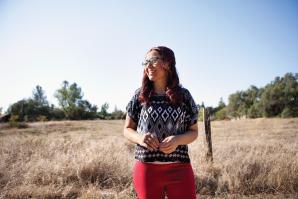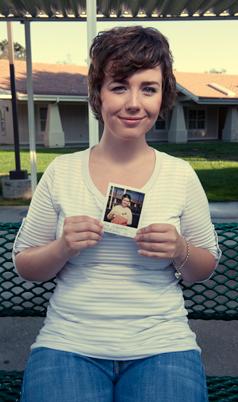Chloe Walker doesn’t remember the first time she moved or how many times she had to pack her belongings in flimsy trash bags. But she remembers getting her first suitcase at age 18, when she became too old for the foster system.
Walker, now 23, still has that suitcase along with a toaster and a teal bath towel given to her in an “emancipation basket.” Such gifts are distributed to foster youth through a Sacramento County program in which the United Way’s Women in Philanthropy program collects toiletries, luggage and household items to distribute in kits to foster youth aging out of the system.
“It seems like such a small thing, a towel set,” Walker says. “But those are the little things you don’t think about.”
This year Women in Philanthropy members — businesswomen, homemakers and civic activists — sponsored Walker to join the group, which typically requires a minimum annual donation of $375.
“Women in Philanthropy is a great opportunity to get involved in the community with a population that needs that nurturing,” Walker says. “United Way focuses on independent living skills and helping (foster youth) as they age out of the system.”
The youngest of four siblings, Walker spent her childhood in and out of child protective services. Her mother had mental health problems and often found herself in abusive relationships — dysfunction that was brought into the home.
“She was a loving and caring mother who wanted to put clothes on our backs and a roof over our heads,” Walker says. “But sometimes, she just couldn’t (function).”
The abuse got worse around age 11, Walker says. She signed up for as many extracurricular activities as possible to stay at school. Between theater and band practice she took computer literacy classes in the school’s technology lab.
“Being in school provided a safe haven,” Walker says. “You were fed, and it was a safe environment.”
The situation came to a tipping point at age 14. Child protective services removed Walker from her home, and she never returned. Her mother died of cardiac arrest six months later.
One of the first places she landed was the Children’s Receiving Home of Sacramento. It’s a temporary refuge for children to live in while social workers explore other arrangements. CEO David Ballard has a picture of 14-year-old Walker on his desk, next to a photo of her nearly 10 years later when she came back as a youth advocate.
“Coming back as a youth mentor, that’s an extraordinary thing,” Ballard says. “It’s not something everyone can do, to come back where you’ve been at a difficult time in your life.”
Through her teen years, Walker became more familiar with packing and lugging trash bags to her next temporary home. These weren’t even the durable bags, she says; they were more like the ones you’d find in office wastebaskets.
“I remember doubling one up and still ripping it,” she says. “And the time I was told not to unpack because I’d be going to another home in the morning.”
One night, she found herself in a placement facility. She pulled a couple of family photos from her bags and found some used tape on a nearby wall. When she tried to tape the photos next to her bed, the staff made her take them down.
“It was a reminder that this wasn’t my home,” Walker says. “And the next place I went to wouldn’t be my home either.”
This nomadic lifestyle with no consistency and little direction would make it easy for a foster youth — or any youth — to develop behavioral issues and engage in risky behavior. The only comprehensive national study on foster youth in the U.S., published in 2001, found that 38 percent were emotionally disturbed, 50 percent had used illegal drugs and 25 percent were tangled in the legal system.
But Walker found solace in her academics. After attending several high schools and continuation programs, Walker transferred to Casa Roble in Orangevale in the middle of her junior year. She graduated with honors in 2006.
Statistics suggest Walker’s case isn’t common among foster youth.
According to the U.S. Department of Education, only half of
foster youth graduate from high school compared to about 85
percent of youth not in the foster program.
“Graduating from high school with honors is a great
accomplishment for any kid,” Ballard says. “With what she’s been
through, it makes it even greater.”
Since graduation, Walker refers to her college career as a “roller coaster,” with several disruptions due to car and financial troubles. But she’s not giving up and is four classes and a lab away from transferring to Sacramento State with an associate’s degree in liberal arts.
In February she became an Americorps member providing services for the Sacramento County Independent Living Program as a youth advocate and leader. This month she’ll go full time with the program, which allows her to reach out to foster youth and the community using social media. She also leads a quarterly support group for emancipated youth.
In August, she became the Sacramento County ambassador for the State Youth Council, which is comprised of former foster youth advocating for policies and practices at the state level.
Walker says she isn’t sure which career to pursue after graduation from Sacramento State, but she knows that she wants to continue, at least part time, advocating for foster youth.
“We all know that these systems that work with children and families need change,” she says. “Having the personal and professional experience makes you invaluable. I know that I can advocate and help make change for someone else.”
A decade of Women in Philanthropy
• United Way’s Women in Philanthropy group is comprised of businesswomen, homemakers and community leaders. Together, these women help local foster youth by raising money, providing training and much more.
• Women in philanthropy boasts 284 members this year, up from 35 in 2001.
• Members have raised more than $1 million for United Way’s foster youth programs since 2001.
• There are 60,000 children under the age of 18 in foster care in California.
• About 300 foster youth are helped every year in the program.
• Ninety-three percent of foster youth in the program are promoted to the next grade level compared to the national average of 45 percent.
• The United Way has expanded its program to help foster youth in all five counties it serves: Amador, El Dorado, Placer, Sacramento and Yolo.
• Life skills workshops help foster youth on topics such as healthy cooking, interview skills, pubic speaking, assertive communication, financial literacy and more. More than 30 life skills workshops have been held the past three years for foster youth.
Recommended For You

Making Cents
Preparing foster youth for their financial future.
For many foster youth, establishing stability within in the foster care system is exceedingly difficult. But it’s after emancipation that the realities of financial independence become even more challenging.

Fostering Hope
Nonprofits and community support provide struggling youth with opportunity
Samantha Smith was 13 when she first left home for the streets of Folsom. Living in and out of foster care, she was driven from homes by conflict and turbulence and returned only when in need of food or clothing.



